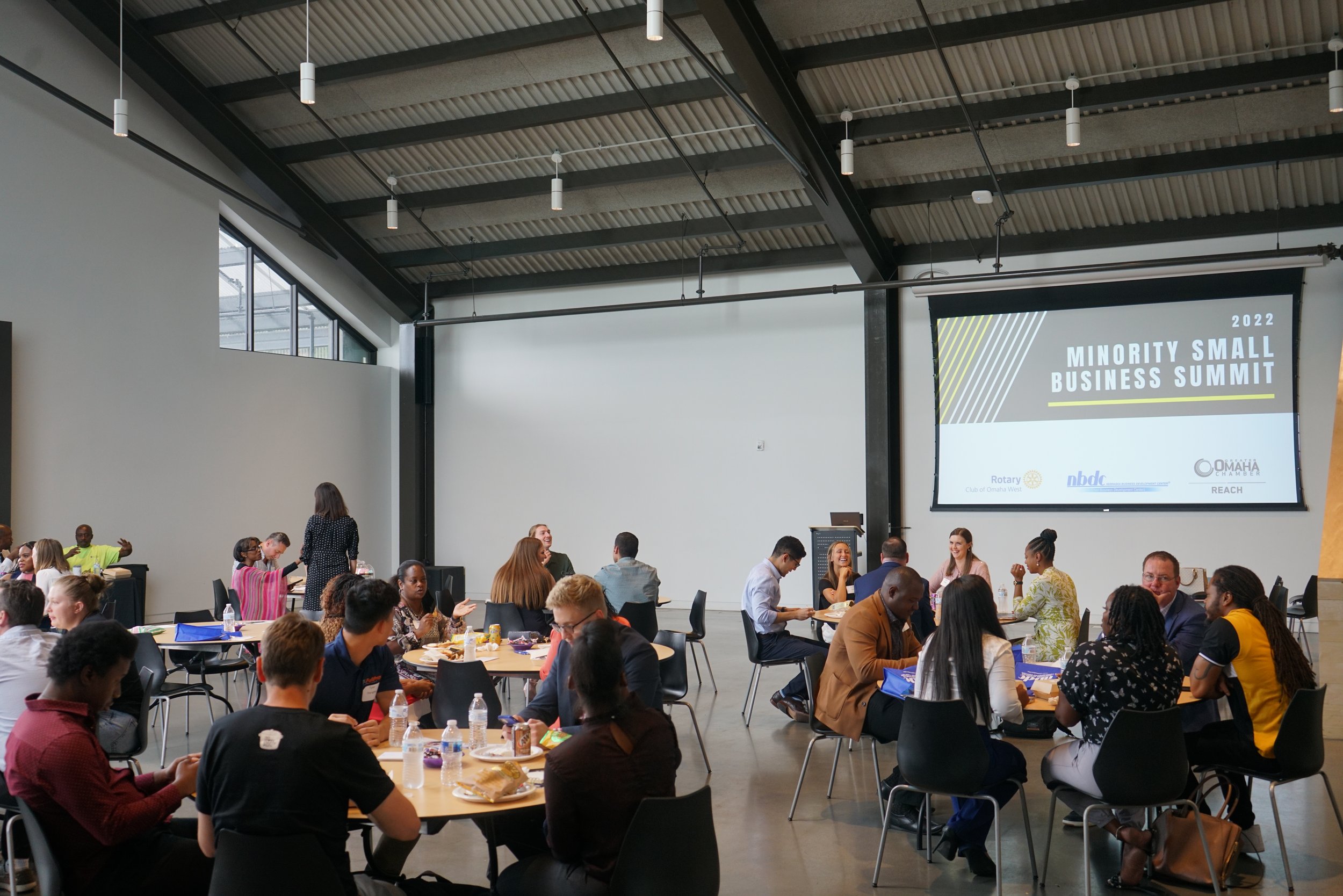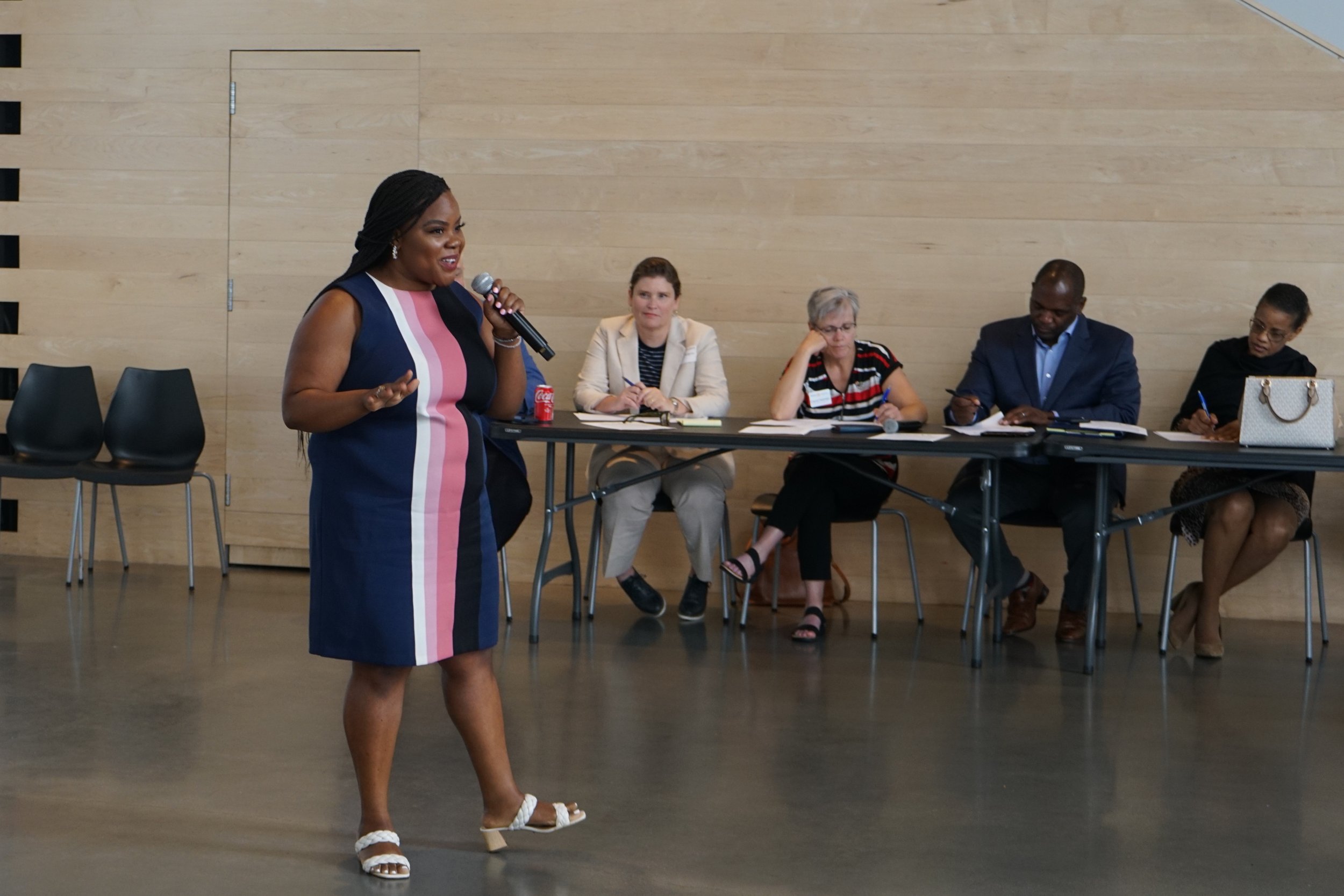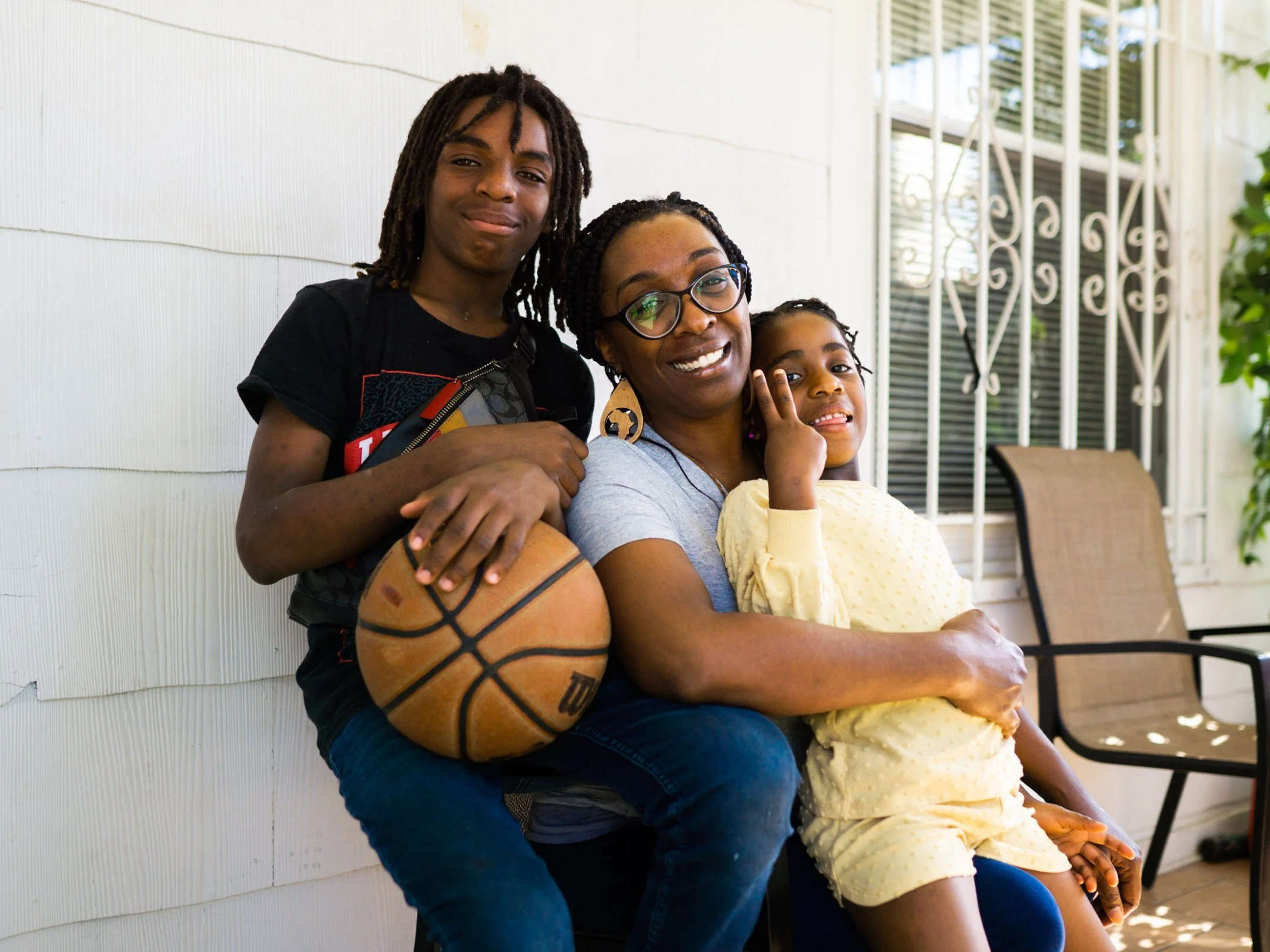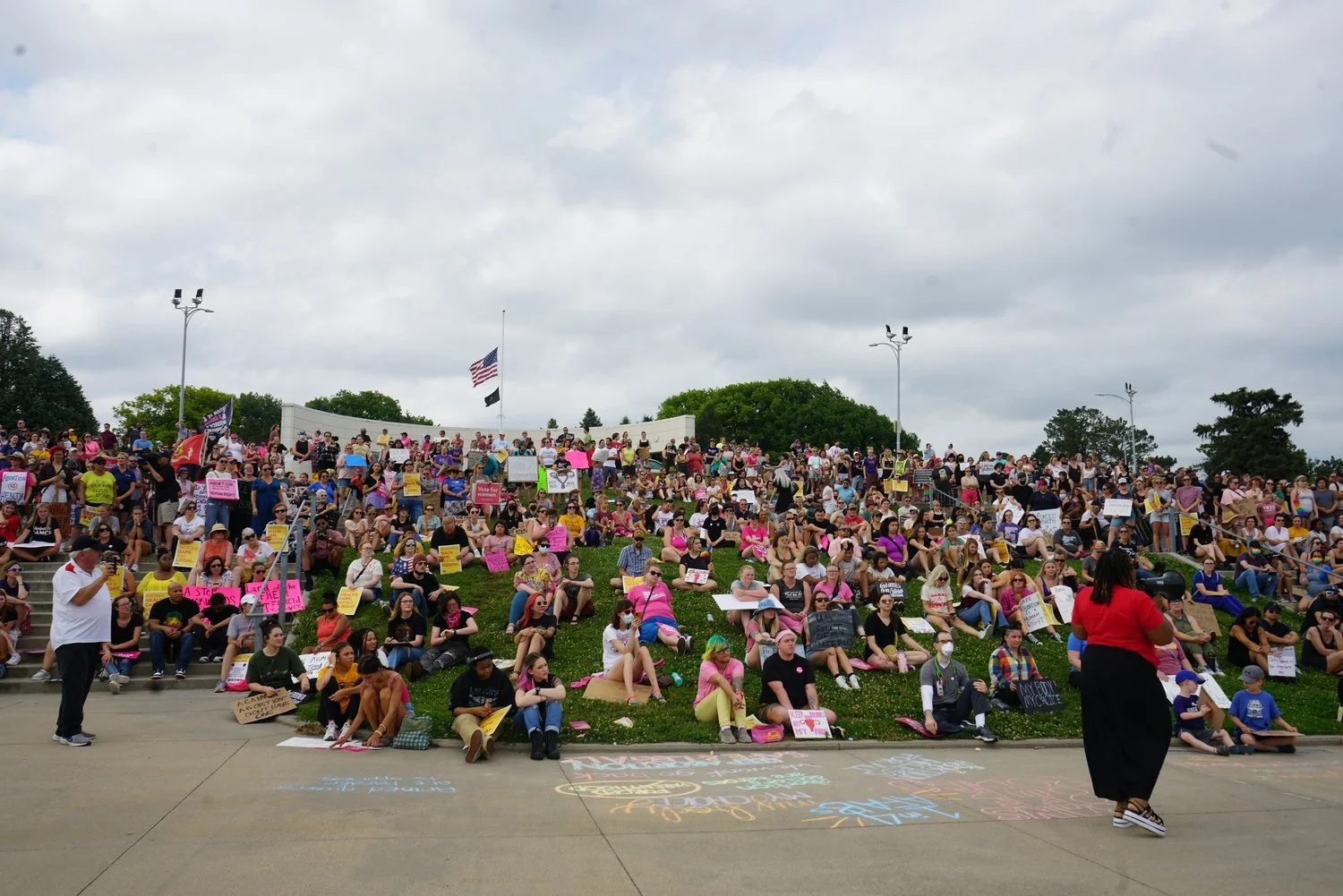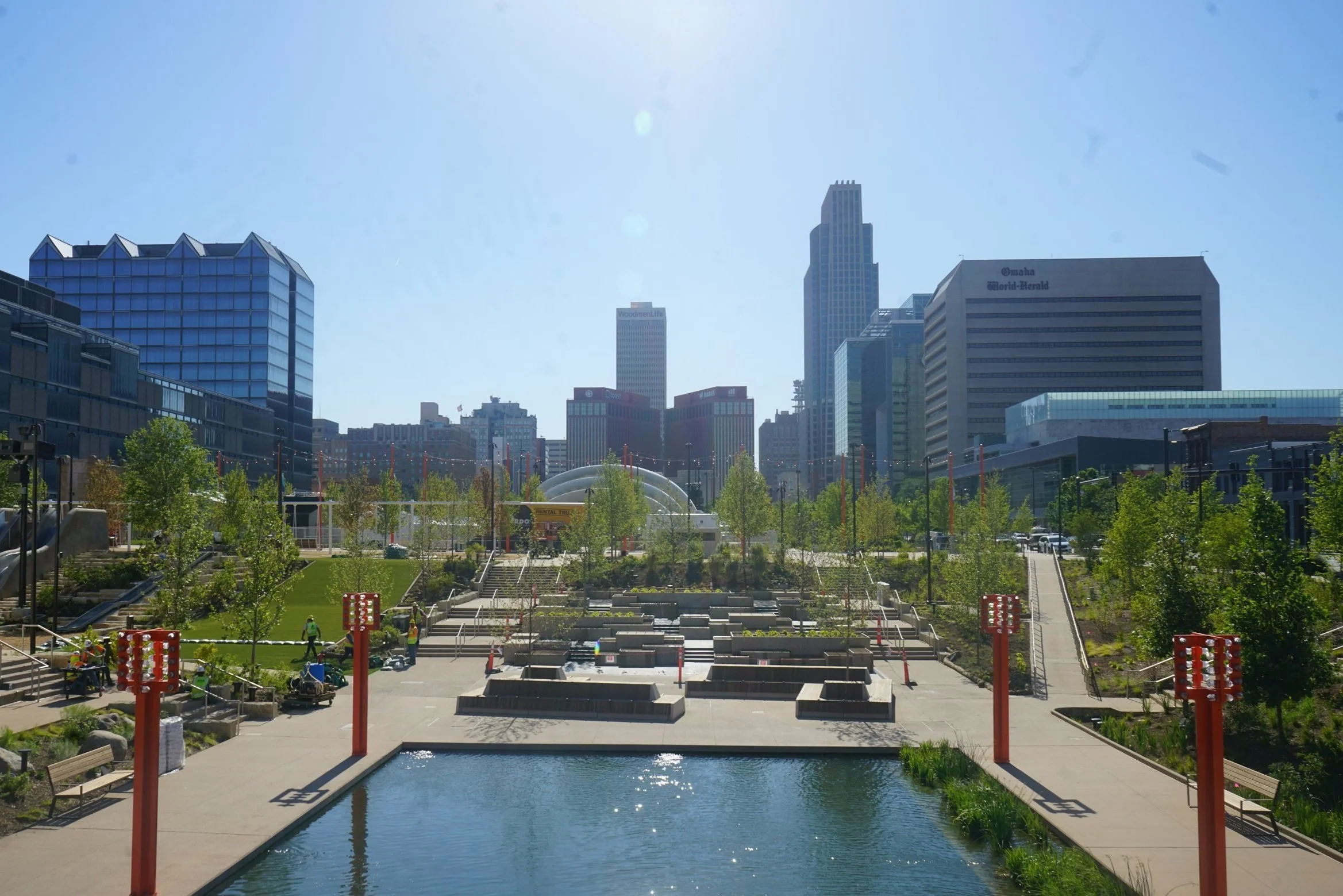Minority Small Business Summit Features Speaker Veta Jeffery and $10,000 Pitch Competition
Participants at the Minority Small Business Summit on June 23, 2022. Photo credit: Odelia Amenyah/ NOISE
By Odelia Amenyah
At last week’s Minority Small Business Summit at the Highlander on N. 30th St., entrepreneurs and small business owners from Omaha gathered to network, participate in educational sessions, connect with community resources, and engage in a pitch competition for a $10,000 grand prize.
While learning from their peers, attendees also learned from this year's keynote speaker, President and CEO of the Omaha Chamber, Veta Jeffery.
"The Greater Omaha Chamber is a resource for you," Jeffery told the crowd.
"Small businesses aren't just the backbone of our economy. You guys represent the engine with which we get to move forward, " Jeffery said, “and so, the Omaha Chamber's support is necessary so we can create an environment where you're able to take root and soar."
For small and emerging business owners, Jeffery said the goal of the Greater Omaha Chamber is to position the city to be a diverse and inclusive workforce, recognizing that diversity is essential to Omaha's growth.
Jeffery referenced a 2021 report written for the Chamber by Dr. Eric Thompson of the University of Nebraska Lincoln (UNL) called “The Barometer: An economic scorecard of the Greater Omaha region.” The report ranked Omaha 5 out of 10 for its inclusivity compared to nine other metros in the United States. A 2021 assessment of 3,750 employees from 21 different organizations revealed that only five percent of Omaha’s minority population owned a business, which is lower than the national average of seven percent.
She said in a 2017 survey, 53% of young professionals in Omaha felt their workplace was not diverse. In the same survey 52% of Black young professionals said they aspired to own their own business, which is a sharp contrast from the five percent of business owners cited in the 2021 Barometer report.
Jeffery stated that by 2050, 41% of the greater Omaha population is projected to belong to minority groups.
Veta Jeffery, president and CEO of the Greater Omaha Chamber. Photo Credit: A.J. Olnes / University of Nebraska at Omaha
"We have to be able to have resources available to help our small and minority businesses to build capacity” and have access to opportunities to grow, she said.
Jeffery was appointed in May as the new president and CEO of the Greater Omaha Chamber. She briefly spoke about her experience working with the State of Missouri helping rebuild businesses in and around Ferguson and St. Louis after the protests that erupted after the police killing of 18-year old Michael Brown in 2014.
Her commitment to being a resource and benefit to entrepreneurs and small business owners comes from her father, an entrepreneur who was the first minority distributor of Kirby vacuum cleaners in Missouri.
"I spent a great deal of my formative years following behind my dad," she said.
Her entrepreneurial spirit led her to run her own business for ten years. She spent 20 years in the banking and financial services industry. However, what changed the course of her life was when she was appointed manager of community economic development for the State of Missouri by Governor Jay Nixon after the uprising that took place in Ferguson, Missouri in 2014.
During this time, Jeffery had many creative opportunities to create programming to make a difference economically.
"It took a lot of learning to bridge gaps and help foster conversations that we were not typically used to having at that time," says Jeffery.
Her last position as chief diversity officer for St. Louis county was not an easy journey. She said one of her core values is to leave every place better than she found it, and she believes her collaborative engagement style and leadership helped move the community forward.
Jeffery listed a few of the Omaha Chamber's programs, such as the REACH program, which aims to guide emerging construction companies to become certified.
The Greater Omaha Work Lab (GrOW) is an employee benefits tool for business owners to have a navigator at their site to help employees cope with life outside of work so they can be present during work.
Building equitable access and opportunities for the Omaha community is a pledge that the Greater Omaha Chamber is committed to making. The Commitment to Opportunity, Diversity and Equity (CODE) was created to help the community achieve sustainable growth in diversity, inclusivity, equity and opportunity.
Talent acquisition resources are another form of support that the Chamber offers to help make recruitment to Omaha easier. Jeffery can attest to her own experience when she told her family and friends she was moving to Omaha, and they asked why.
She told them, “Omaha is one of America's best-kept secrets.”
“Omaha is one of America’s best-kept secrets.”
"While I'm excited by what the Chamber has done in this field, I am a believer that we can always move forward. We can always include more people and we can always teach how to be intentional with the outcomes and efforts,” said Jeffery. That commitment is not only crucial for business owners but for their family and friends as well.
"The hardest thing is to not have your family, spouse, children, in-laws, best friends be able to support you as you commit to your business and the work you want to do," said Jeffery.
She emphasized that making it big is not predestined, but the grit, grind, and assistance that is given along the way is what helps businesses prosper.
For Jeffery, her objective while serving the Omaha community is to form relationships where business owners feel like they have someone they can turn to who is invested in their success just as much as the Chamber is invested in theirs.
"We need people who dream so big that the people around them are telling them that their dreams are stupid,” said Jeffery, “that they could never happen, that you are not capable, that you're not the person to do it.”
She points out that business is just an opportunity for someone to do something that someone else cannot, and to be able to create something that fills a hole.
"I was asked to come here and do something different. I was charged with bridging gaps, making alliances, making stronger commitment and intentionality for all those who seek to grow Omaha together, and I am committed to doing so," said Jeffery.
Jeffery challenged attendees to get involved and take the chance to talk to her and the Greater Omaha Chamber, but most of all, help one another by spreading good reviews of other businesses and referring them for business .
"Be that supportive network intentionally for each other, '' Jeffery said.
Kani Rubango, Honor Jones, Carina Glover and Adriana Cisneros Baulto at the Minority Small Business Summit. Photo credit: Odelia Amenyah/ NOISE
She urged the audience to participate in Omaha Chamber events with their hands raised, ready to share their experiences, ready to serve and ready to share their expertise.
"We need you to be successful. Omaha can't be successful if you're not successful,“ said Jeffery.
Attendees also had the opportunity to engage in a pitch competition sponsored by the Nebraska Business Development Center (NBDC) at the University of Nebraska at Omaha, Greater Omaha Chamber, REACH, and Omaha West Rotary. Fifty-five applicants entered to win a grand prize of $10,000. The top five finalists were able to present a timed pitch in front of judges.
Bruno Caro, owner and founder of Hazlo Health. Photo Credit: A.J. Olnes / University of Nebraska at Omaha
The finalists included online mental health service Call Kani; home-based Honey-n-Luv Gluten Free Bakery; an app that connects women entrepreneurs with other women-owned businesses called HerHeadquarters; an employee lifestyle benefit program named Maxwell; and an app to answer health questions for chronically ill patients called Hazlo Health.
The winner of the $10,000 grand prize was Hazlo Health. Bruno Caro, owner and founder, plans to use the funds to further develop his app to help reach more patients with chronic illnesses.
The $5,000 grand prize went to Carina Glover, owner of HerHeadquarters. While Kani Rubango owner of Call Kani, Honor Jones and Amanda Jones owners of Honey-n-luv Gluten Free Bakery and Adriana Cisneros Baulto owner of Maxwell each received $1,000.

